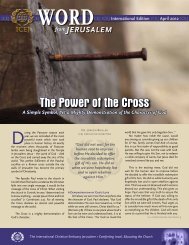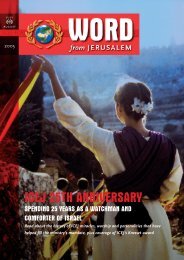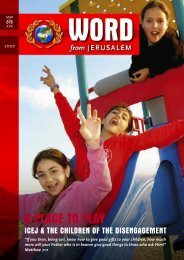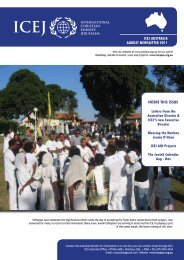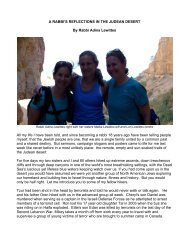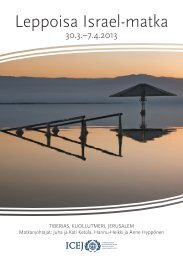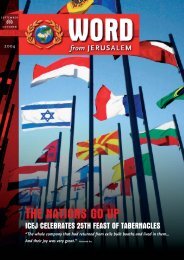WORD
WFJ Nov 2008 - International Christian Embassy Jerusalem
WFJ Nov 2008 - International Christian Embassy Jerusalem
Create successful ePaper yourself
Turn your PDF publications into a flip-book with our unique Google optimized e-Paper software.
6 SERVING THE NATION <strong>WORD</strong> FROM JERUSALEM<br />
<strong>WORD</strong> FROM JERUSALEM 7<br />
Living History<br />
ICEJ AID helps hundreds celebrate the Jewish New Year with dignity,<br />
enlisting Israeli teens to help distribute holiday gifts and learn more<br />
about the elderly Holocaust survivors ‘next door’.<br />
At the call of the shofar this Rosh Hashana,<br />
families throughout Israel blessed each<br />
other with a wish for a New Year<br />
of plenty as they ushered in the<br />
so-called ‘Days of Awe’ – the start of the fall<br />
High Holiday season. It is a unique time<br />
in the Jewish calendar which combines<br />
introspection and celebration culminating in<br />
the 8-day festival of Succot, better known in<br />
scripture as Tabernacles, the ‘Feast of Joy’.<br />
Increasing Anxiety<br />
Yet, with the dramatic plunge in the global markets,<br />
many of Israel’s most vulnerable communities viewed the<br />
New Year holiday this past October with increasing anxiety.<br />
Despite the recent wage and employment increases in Israel,<br />
poverty levels have also risen in the past twelve months. The latest<br />
government statistics tell of some 420,000 impoverished families<br />
representing some 1.6 million Israelis, half of whom are children.<br />
In a country with a population of just over 7 million, this represents<br />
well over 20% of Israelis as the gap between the rich and the poor<br />
widens.<br />
Of greatest concern, however, is the demographic breakdown<br />
of poverty in Israel. Nearly 20% of recent immigrants live below<br />
the poverty line, 32% of Christians, 50% of Arab-Muslims and 57%<br />
of ultra-orthodox Jews. Key sectors in society are being left behind,<br />
among them the dwindling number of elderly Holocaust survivors.<br />
By Nicole Yoder & Maxine Carlill<br />
“Key sectors in society are<br />
being left behind: Recent<br />
immigrants, Christians, and<br />
ultra-orthodox Jews...”<br />
Miri and Daniella<br />
For Miri, a single mother and immigrant<br />
from South America, such statistics come<br />
as no surprise. Although Miri works part<br />
time in a low paying job and receives<br />
minimal welfare assistance, nearly her<br />
entire income must go to cover bills<br />
leaving her with little to spend on basic<br />
needs. Faced with poor health and no<br />
support from the father of her child, Miri<br />
is alone in a difficult situation. Anxious to<br />
do all she can to improve her situation, Miri is<br />
currently studying Hebrew to enable her to find work in<br />
her profession of business management.<br />
Daniella, a Jerusalem resident coping with long-term sickness,<br />
faced similar challenges after being separated from her husband due<br />
to his continual abuse and outbursts of rage. When her son died<br />
unexpectedly, she fell into deep depression. Daniella lives off a minimal<br />
disability pension and struggles to buy even the simplest of foods.<br />
Not Forgotten<br />
Miri and Daniella are just two of the hundreds helped over Rosh<br />
Hashana by ICEJ AID, the Embassy’s social assistance arm. Holiday<br />
food baskets were distributed by Embassy staff and Israeli partners<br />
as a direct expression of the love of Christians from around the<br />
world. In Kiryat Gat, an Ethiopian immigrant town, community<br />
leaders said the impact of the Embassy’s holiday baskets went far<br />
beyond the food they contained.<br />
“The social welfare department in our town hasn’t been able to<br />
give out even a symbolic gift at the holiday for the past 4-5 years,”<br />
said local aid worker Avraham Abouya. “If we did not receive<br />
help from ICEJ AID and others, we would have nothing to give to<br />
the many needy in our community. Your gift lets them feel that<br />
someone cares about them and that they are not forgotten.”<br />
Living History<br />
Northwards in the Golan town of Katzrin, nestled in the hills<br />
above the Sea of Galilee, Embassy staff took part in a unique<br />
educational project using local 12th grade students to carry baskets<br />
of fruit and traditional holiday foods to local Holocaust survivors,<br />
including many that are helped regularly through the ICEJ’s Adopta-Holocaust-Survivor<br />
program.<br />
Vladimir and Vera<br />
ICEJ AID Deputy Direcor Yudit Setz (pictured right) tells<br />
of her encounter with Vladimir and Vera, during the recent<br />
Rosh Hashana food drive. These elderly Russian Holocaust<br />
survivors are not yet part of the Embassy’s adoption<br />
program and live in great need and despair. A simple visit,<br />
Yudit admits, can be life-changing...<br />
“We went to the home of Vladimir and Vera, a husband<br />
and wife, not yet ‘adopted’. Both were in pain, Vladimir had<br />
recently undergone an operation, his wife suffered from<br />
health problems that seriously affected her legs.<br />
“She cried as she told us of their need for financial help<br />
to cover their medical needs and how she wanted to die<br />
because of the constant pain. Like many older immigrants,<br />
they have not been able to master Hebrew, but we were<br />
able to understand enough of their Yiddish to get by.<br />
“There were not only tears but a lot of joy at our visit.<br />
Vera pulled out old photos and showed them with so much<br />
pleasure. This couple represent many who are lonely and in<br />
poor health, who live with just their memories. It was a joy to<br />
give them a gift for them this significant Jewish festival.”<br />
The students first learned about the history of the<br />
Holocaust before fanning out across the town to<br />
distribute ICEJ AID holiday packages to the living<br />
witnesses of that history in their community.<br />
The experience left a deep impact on many of<br />
the teenagers who until then knew nothing<br />
of the elderly survivors ‘next door’.<br />
“I discovered there were Holocaust<br />
survivors living in my street,” one girl<br />
responded. “I will definitely be visiting them<br />
from now on.”<br />
Need for Belonging<br />
For many of the elderly in Katzrin, it was the first time<br />
they had received a home visit on Rosh Hashana for many years.<br />
Lydia, herself a survivor who came from the Ukraine 18 years ago,<br />
works with other survivors from the former Soviet Union. She told<br />
us that not all the immigrants have family in Israel and they are so<br />
happy to receive help and attention during the holidays. “It helps<br />
them to feel part of Israel,” she said.<br />
“I discovered there were<br />
Holocaust survivors living<br />
in my street,” responded<br />
one Israeli girl. “I will<br />
definitely be visiting<br />
them from now on”<br />
The Katzrin project was also duplicated in the Tel<br />
Aviv suburb of Holon where three hundred and fifty<br />
elderly received generous ICEJ AID food baskets<br />
and blankets also hand-delivered by the young<br />
people of the town.<br />
Thank you to all our supporters whose<br />
faithful giving made such a tangible<br />
difference in so many Israeli lives.<br />
Adopt a Holocaust Survivor today:<br />
www.icejusa.org/adopt




